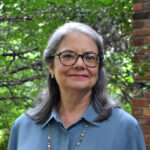 Purim: A Hidden Mussar Journey, by Heidi Schneider
Purim: A Hidden Mussar Journey, by Heidi Schneider
Queen Esther’s journey that we are about to recall during the festival of Purim parallels my own Mussar path. In the Five Books of Miriam, scholar Ellen Frankel calls Esther, “the Hidden One.” Esther did not reveal her heritage or her family to the king, even after she rose to royalty. She remains secluded. Like Esther, I kept my love of Mussar hidden, even from myself.
Queen Esther lives a life of privilege in the palace, sheltered from the world outside. Does she know about the rising threat to the Jewish people, concocted by Haman with permission of the king? Is she too isolated to see it? Does she know of the danger and feel powerless to act? She holds herself remote.
I took my first Mussar class from Rabbi Harold Kravitz. I was not particularly interested in the topic but looked forward to learning with my beloved teacher. After the class ended, I retreated from further study.
Mordechai, Esther’s guardian, calls her out for remaining quiet against the impending violence: “Do not imagine that you, of all the Jews, will escape with your life.” (Esther 4:13 -14). History reminds us that too often Ra consumes the voiceless, Jews and others. Too often, like Esther, I have observed suffering from a distance, feeling anxious, but unprepared to make a difference.
Mussar once again demanded my attention when Rabbi Ira Stone visited our synagogue to lead a Shabbaton. After I heard Rabbi Stone eloquently speak about how Mussar teaches us to bear the burden of the other, I decided to study online with the Center for Contemporary Mussar. I took an introductory class, and then re-enrolled for a full semester. Completing the full three-year CCM course was far from my mind. I wanted to sip occasionally from the cup of Mussar, safe in my familiar surroundings and self-absorption. I chose the few times that I felt comfortable enough to reach out to the other–always on my own terms.
Mordechai continues to confront Queen Esther, recognizing that she is not yet ready to reveal her secret. He adds: “And who knows, perhaps you obtained your royal position for just such a crisis.” (Esther 4:14). Esther, Mordechai urges, it is time for you to use your privilege for good. You have been placed in a position to make a difference. Use your voice for change.
One of my teachers, Carol Daniels, called me after the first semester to check-in. I advised her that the class was not a good fit for me, and I did not plan to register for any more Mussar study. What good fortune that Carol reached out to me! She recognized the fear I held inside, trepidation about a deeper spiritual commitment and confronting unacknowledged truths about myself. Carol suggested that I consider taking one more semester in the class, because she saw potential. If I was still convinced that Mussar was not my path, we could say good-bye. I am so glad that Carol’s kindness and wisdom encouraged me to stay. Carol’s Tov helped me find the courage to step out of the shadows and gave me strength to focus on the other’s burden.
Esther leaves her inner sanctum in the palace and uses her hidden strengths to bring Tov to the crisis. She employs the middah of Bitachon/trust: “If worry comes to your heart, take it as a warning from God who loves you. Examine your deeds and take counsel with those whose advice you seek. When you have fulfilled God’s will, trust God and your serenity will return.” Esther examines her reluctance; she listens to the advice of Mordechai; she steps fully into her role as queen and fulfills God’s will to rescue the Jewish people from destruction.
Bitachon is a middah I return to again and again. It is currently written on a Post-It note on my desk, where I see it as I work. Mussar has guided my steps each day for the last three years. Daily practice kept me centered and grateful during a pandemic. Reciting my Ner Tamid reminded me to remain semi-permeable as I handled hostile phone calls for my candidate during the election cycle. When my 96-year-old mother tested positive for COVID at the same time our Capitol was breached, Bitachon reminded me of the steps needed to serve my mom and sisters with undivided attention. My mother remains healthy, our democracy recovers, and my serenity has returned. But Bitachon and the other middot remain the scaffolding that holds me up, day by day.
Maybe it would have been easier for me to stay hidden from the challenges that Mussar poses. If Carol had not lovingly encouraged me to take the risk, I would have avoided an opportunity for transformation. I might not have incorporated into my daily routine the practices of mitzvot, prayer, meditation, and self-examination through Cheshbon haNefesh. I could have secluded myself from the everyday chance to bring goodness into the lives of others, from the clerk at the post office to my nearest other–who now works full-time from home under pandemic protocols. Perhaps our sheltering-in-place life together would have brought us into more conflict, instead of greater intimacy, if I had withheld myself from him.
My Mussar teachers at CCM, my Chevrutah partner, and my Va’ad have been blessings to me during the crucible of the last three years. Their candid exhortations that I can reach out better to the other, that I can move from my self-absorption, and their wise counsel have brought me out of hiding. I am deeply grateful.
 Minnesota native, Heidi Schneider, was the previous president of Adath Jeshurun Congregation in Minnetonka. She currently serves as Chair of the Masorti Foundation for Conservative Judaism in Israel, and teaches in local schools and churches on issues related to Israel and Judaism. She is a student of Carol Daniels and Linda Kriger of blessed memory.
Minnesota native, Heidi Schneider, was the previous president of Adath Jeshurun Congregation in Minnetonka. She currently serves as Chair of the Masorti Foundation for Conservative Judaism in Israel, and teaches in local schools and churches on issues related to Israel and Judaism. She is a student of Carol Daniels and Linda Kriger of blessed memory.
